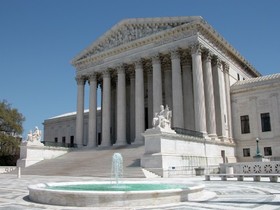Further loosening the reins on the role of money in politics, the U.S. Supreme Court today struck down restrictions on the grand total that any person can contribute to all federal candidates for office.
Today's decision left intact the cap of $2,600 per election that a contributor to give to any single candidate for federal office, but it invalidated the separate limit on how much can be contributed to all federal candidates put together — $48,600.
The law was challenged by the Republican Party and an Alabama businessman, Shaun McCutcheon, who argued that the contribution ceilings were an unconstitutional restriction on his free expression.
"It's about freedom of speech and your right to spend your money on as many candidates as you choose. It's a basic freedom," McCutcheon said in bringing the challenge.
Supporters of what's known as the aggregate contribution limit said its purpose was to help prevent corruption. Without it, warned Fred Wertheimer, a longtime proponent of federal regulation of contributions, "you will establish a system of legalized bribery like we used to have before the Watergate scandals."
Under the aggregate limits, an individual could donate a maximum of $48,600 to all candidates for federal office plus another $74,600 to national political parties, state and local political parties, and political action committees — a grand contribution total of $123,200 per election.
House Speaker John Boehner hailed the decision, saying "freedom of speech is being upheld."

